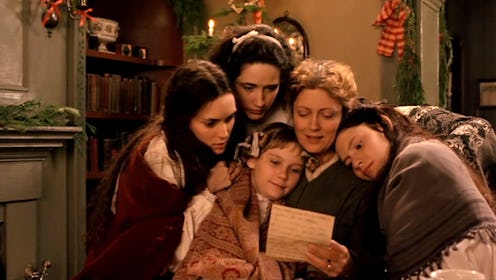Books
Why We're Still Obsessed With 'Little Women'

Before Kim, Khloe, Kourtney, Kylie, and Kendall, we had the original sister drama with Meg, Jo, Amy, and Beth. Little Women was an instant bestseller nearly 150 years ago, and readers are still feeling the love. Since then, half a dozen movies have been made about the March family, two TV series, an opera, a Broadway musical, and even a Japanese anime version. So why are we still obsessed with Louisa May Alcott’s Little Women? It’s the old saying: the more things change, the more they stay the same.
My new novel, The Wedding Sisters , is loosely inspired by the adventures of Jo and her sisters. When Meryl Becker's three daughters — Meg, Amy, and Jo — all get engaged, she's over the moon with happiness. Her only complaint? She and her husband, Hugh, can't really afford three weddings. They decide to host a triple wedding, and in the weeks leading up to the grand event, Meryl and her daughters learn the true meaning of love, marriage, and family.
I love Little Women — as you can tell from the plot of my book. Despite the fact that it was written in the 1800s, its lessons still hold true today. Here are five reasons why we're still obsessed with Little Women:
1. We worry about money and status.
“I don’t think it’s fair for some girls to have plenty of pretty things, and some girls nothing at all.”
Amy March says this on the first page. Has this ever been more true that the age of the 1%? With our nonstop celebrity culture, it’s easy to think you’re the only one without a stylist and private jet — making the words written over a century ago by Louisa May Alcott more true now than ever before. Yes, little Amy March nailed it, and we’re all feeling her pain.
2. We love a rebellious heart.
“Little notice was taken of her stories, but they found a market; and, encouraged by this fact, she resolved to make a bold stroke for fame and fortune.”
Jo March, the second oldest of the four sisters, is the original ‘alt’ girl. If she were alive today, she’d be co-founder of Lena Dunham’s “Lenny” newsletter. As written, she is the ‘boyish’ one; she has a temper that gets her into trouble, and for much of the book, she rejects the idea of marriage. She is spectacularly different than other young women in her world because her main focus is on her writing career. As a result, she continues to inspire generations of outsider, artistic girls.
3. We have family members in war zones.
“I gave my best to the country I love, and kept my tears til he was gone.”
Mother March’s (“Marmee’s”) husband is off fighting the Civil War. The first half of Little Women is rife with financial and emotional hardship because he is gone. Marmee loves her country, and she loves her husband. Like Marmee in the 1860s, people today are making hard sacrifices with their mothers, fathers, husbands and wives serving their country. We love them for it, as we still love Marmee.
4. We still believe in marriage.
“So she made her wedding gown herself, sewing into it the tender hopes and innocent romances of a girlish heart.”
Meg, the oldest March sister, is the first to get married. No surprise there; Little Women was written in an age when marriage was expected. Even headstrong Jo gives in to marriage and motherhood by the end. Today, we like to think we are too modern and independent to be seduced by the lure of matrimony. But the reality is, we’re still saying “Yes to the dress.” And that’s not a bad thing.
5. Deep down, we all want a happy ending.
“Wealth is certainly a most desirable thing, but poverty has its sunny side, and one of the sweet uses of adversity is the genuine satisfaction which comes from hearty work of head or hand; and to the inspiration of necessity we owe half the wise, beautiful, and useful blessings of the world.”
The March family rises above poverty, wartime, and the constrictions of their era to find love, careers, and personal happiness. But most of all, and through it all, they never lose sight of the value of family. In the end, surrounded by her daughters and grandchildren, Marmee says, “Oh, my girls, however long you may live, I can never wish you a greater happiness than this.” It is our universal wish for the same that keeps us coming back to Little Women.
Jamie Brenner is obsessed with Little Women. Her new novel, The Wedding Sisters , is loosely inspired by her favorite literary family.
Image: Colombia Pictures